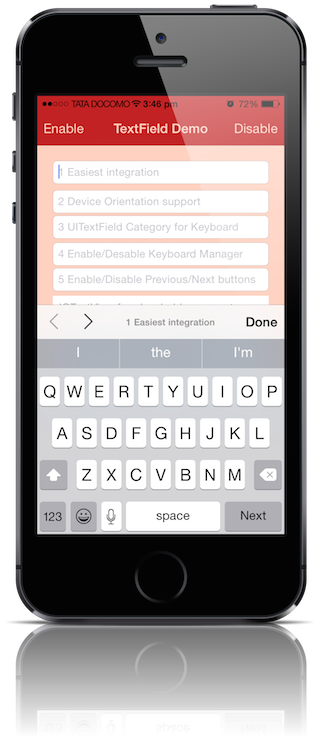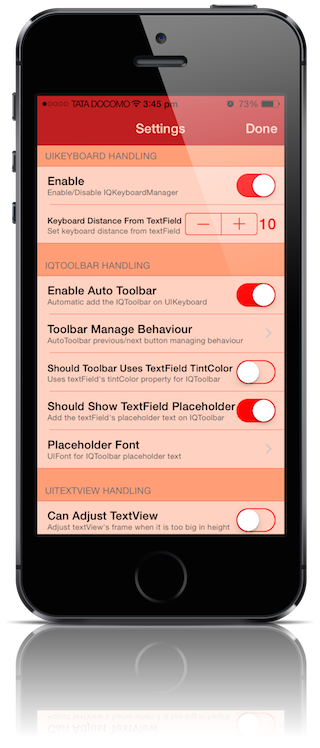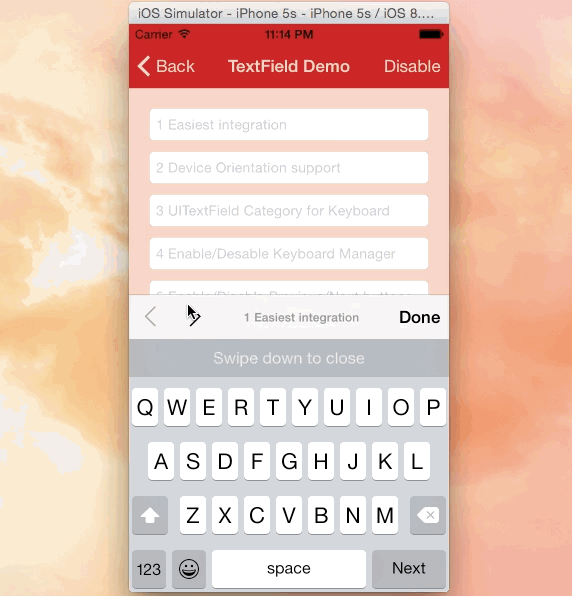9.5 KiB
![]()
IQKeyboardManager

While developing iOS apps, we often run into issues where the iPhone keyboard slides up and covers the UITextField/UITextView. IQKeyboardManager allows you to prevent this issue of keyboard sliding up and covering UITextField/UITextView without needing you to write any code or make any additional setup. To use IQKeyboardManager you simply need to add source files to your project.
Key Features
-
**CODELESS**, Zero Lines of Code -
Works Automatically -
No More UIScrollView -
No More Subclasses -
No More Manual Work -
No More #imports
IQKeyboardManager works on all orientations, and with the toolbar. It also has nice optional features allowing you to customize the distance from the text field, behaviour of previous, next and done buttons in the keyboard toolbar, play sound when the user navigates through the form and more.
Screenshot
GIF animation
Video
Tutorial video by @rebeloper (#1135)
@rebeloper demonstrated two videos on how to implement IQKeyboardManager at it's core:
https://www.youtube.com/playlist?list=PL_csAAO9PQ8aTL87XnueOXi3RpWE2m_8v
Warning
- If you're planning to build SDK/library/framework and want to handle UITextField/UITextView with IQKeyboardManager then you're totally going the wrong way. I would never suggest to add IQKeyboardManager as dependency/adding/shipping with any third-party library. Instead of adding IQKeyboardManager you should implement your own solution to achieve same kind of results. IQKeyboardManager is totally designed for projects to help developers for their convenience, it's not designed for adding/dependency/shipping with any third-party library, because doing this could block adoption by other developers for their projects as well (who are not using IQKeyboardManager and have implemented their custom solution to handle UITextField/UITextView in the project).
- If IQKeyboardManager conflicts with other third-party library, then it's developer responsibility to enable/disable IQKeyboardManager when presenting/dismissing third-party library UI. Third-party libraries are not responsible to handle IQKeyboardManager.
Requirements
| Language | Minimum iOS Target | Minimum Xcode Version | |
|---|---|---|---|
| IQKeyboardManager | Obj-C | iOS 8.0 | Xcode 9 |
| IQKeyboardManagerSwift | Swift | iOS 8.0 | Xcode 9 |
| Demo Project | Xcode 11 |
Swift versions support
| Swift | Xcode | IQKeyboardManagerSwift |
|---|---|---|
| 5.1, 5.0, 4.2, 4.0, 3.2, 3.0 | 11 | >= 6.5.0 |
| 5.0,4.2, 4.0, 3.2, 3.0 | 10.2 | >= 6.2.1 |
| 4.2, 4.0, 3.2, 3.0 | 10.0 | >= 6.0.4 |
| 4.0, 3.2, 3.0 | 9.0 | 5.0.0 |
Installation
Installation with CocoaPods
IQKeyboardManager (Objective-C): IQKeyboardManager is available through CocoaPods. To install it, simply add the following line to your Podfile: (#9)
pod 'IQKeyboardManager' #iOS8 and later
IQKeyboardManager (Swift): IQKeyboardManagerSwift is available through CocoaPods. To install it, simply add the following line to your Podfile: (#236)
Swift 5.1, 5.0, 4.2, 4.0, 3.2, 3.0 (Xcode 11)
pod 'IQKeyboardManagerSwift'
Or you can choose the version you need based on Swift support table from Requirements
pod 'IQKeyboardManagerSwift', '6.3.0'
In AppDelegate.swift, just import IQKeyboardManagerSwift framework and enable IQKeyboardManager.
import IQKeyboardManagerSwift
@UIApplicationMain
class AppDelegate: UIResponder, UIApplicationDelegate {
var window: UIWindow?
func application(_ application: UIApplication, didFinishLaunchingWithOptions launchOptions: [UIApplication.LaunchOptionsKey: Any]?) -> Bool {
IQKeyboardManager.shared.enable = true
return true
}
}
Installation with Carthage
Carthage is a decentralized dependency manager that builds your dependencies and provides you with binary frameworks.
You can install Carthage with Homebrew using the following command:
$ brew update
$ brew install carthage
To integrate IQKeyboardManger or IQKeyboardManagerSwift into your Xcode project using Carthage, add the following line to your Cartfile:
github "hackiftekhar/IQKeyboardManager"
Run carthage to build the frameworks and drag the appropriate framework (IQKeyboardManager.framework or IQKeyboardManagerSwift.framework) into your Xcode project based on your need. Make sure to add only one framework and not both.
Installation with Source Code
IQKeyboardManager (Objective-C): Just drag and drop IQKeyboardManager directory from demo project to your project. That's it.
IQKeyboardManager (Swift): Drag and drop IQKeyboardManagerSwift directory from demo project to your project
In AppDelegate.swift, just enable IQKeyboardManager.
@UIApplicationMain
class AppDelegate: UIResponder, UIApplicationDelegate {
var window: UIWindow?
func application(_ application: UIApplication, didFinishLaunchingWithOptions launchOptions: [UIApplication.LaunchOptionsKey: Any]?) -> Bool {
IQKeyboardManager.shared.enable = true
return true
}
}
Installation with Swift Package Manager
Swift Package Manager(SPM) is Apple's dependency manager tool. It is now supported in Xcode 11. So it can be used in all appleOS types of projects. It can be used alongside other tools like CocoaPods and Carthage as well.
To install IQKeyboardManager package into your packages, add a reference to IQKeyboardManager and a targeting release version in the dependencies section in Package.swift file:
import PackageDescription
let package = Package(
name: "YOUR_PROJECT_NAME",
products: [],
dependencies: [
.package(url: "https://github.com/hackiftekhar/IQKeyboardManager.git", from: "6.5.0")
]
)
To install IQKeyboardManager package via Xcode
- Go to File -> Swift Packages -> Add Package Dependency...
- Then search for https://github.com/hackiftekhar/IQKeyboardManager.git
- And choose the version you want
Migration Guide
Other Links
Flow Diagram
If you would like to see detailed Flow diagram then check Detailed Flow Diagram.
LICENSE
Distributed under the MIT License.
Contributions
Any contribution is more than welcome! You can contribute through pull requests and issues on GitHub.
Author
If you wish to contact me, email at: hack.iftekhar@gmail.com








